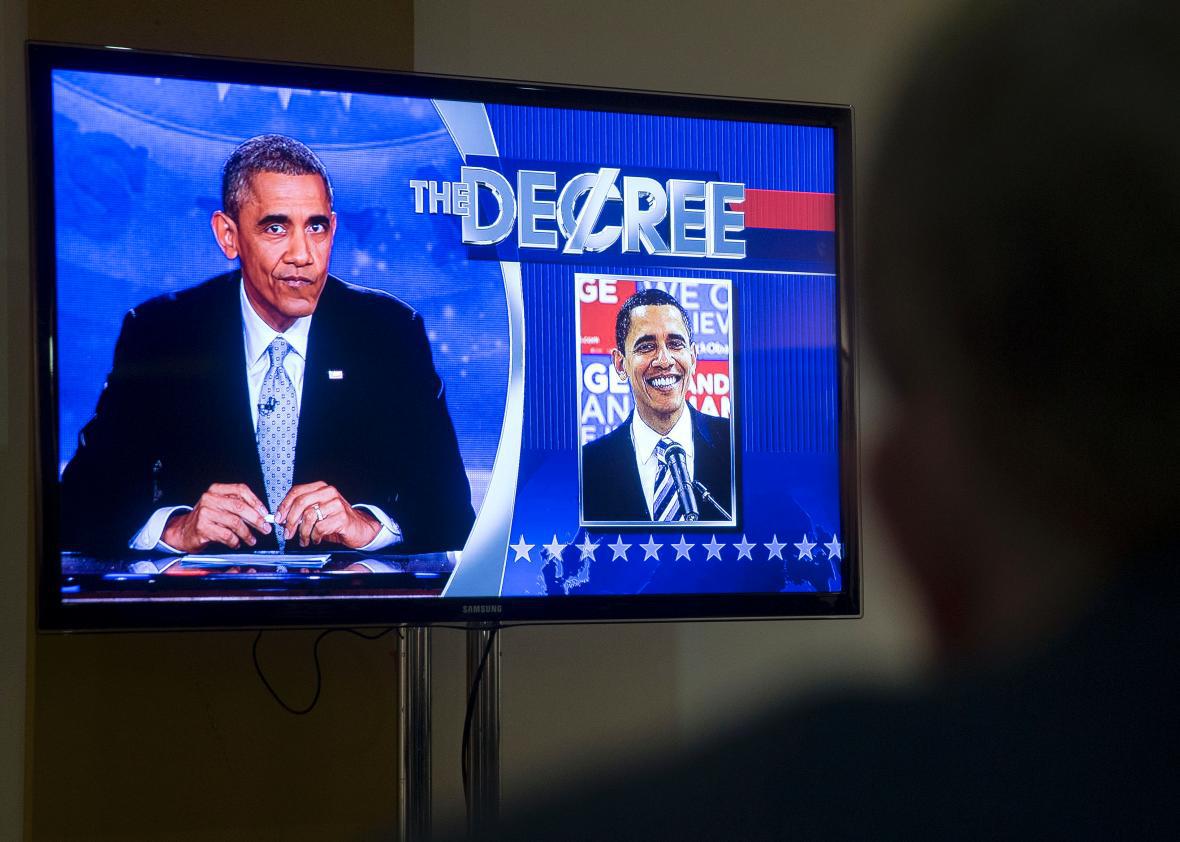Of all the sentence fixings—the adjectives and conjunctions spicing up the subject-verb burger—prepositions may be the most bedeviling. Are you sick with pneumonia or from pneumonia? Do you have an opinion of Donald Trump, or about Donald Trump, or on Donald Trump? (That last conjures an orangey thatch of disapproval squatting atop the candidate’s scalp.) Every now and then, a preposition-addled entertainment writer fires off the same question, seemingly unanswerable and yet recurring, like a soul destined to be reincarnated until it figures things out. Why is an actor in a movie but on a TV show?
In an email (but also on a screen), linguist Rob Chirico offered Lexicon Valley a historical hypothesis. He argued that early filmgoers analogized the movie theater to a live theater. (Often those early movie theaters were live theaters, repurposed.) Since thespians performed in the theater, they likewise acted in a movie—the new arena for their talents. Television actors, on the other hand, and also in contrast, and also by contrast, did not exist inside the black box; they were broadcast on channels, sucked into antennae, and splashed across the screen as moving pictures. They were therefore said to be on TV.
And yet live actors also perform on a stage; we say that we saw George Clooney on film—could it really be that a vague analogy between the playhouse and the cinema hall is responsible for the “in a movie” convention? A second hypothesis, one favored by Reddit users, points to a category difference between TV and films. Whereas the idiot box counts as a physical object—a screen on which ephemeral stories flicker and dance continually—a movie is but one of those ephemeral stories, a collection of information bounded by a beginning and an end. The word containment crops up again and again in the Reddit thread (or on the thread, like a pearl on a strand?), as if the formal structure of cinema were a political strategy for managing the ambitions of the script. “A movie is a single contained work that stands alone while a TV show is open and continuous. Like, ‘in a pool’ and ‘on a track,’ ” one user wrote. On Twitter, and also in my Twitter feed, video producer Chris Wade suggested that a movie “is singular, self-contained,” while TV is “ongoing, a platform, different performers can be on it.”
But Chris Rock can appear on a single episode of Empire, as well as on a multiepisode arc. Likewise, he could appear in Empire, the ongoing project, as a recurring character (though he doesn’t—he’s just in Episode 1 of the second season.) Which is to say: You can use in for specific TV shows as well as on—just as you can toggle between the two prepositions for other, select types of media. Here’s a more comprehensive breakdown:
ON ONLY
On TV
On film
On tape
On stage
On the Internet
EITHER ON OR IN
On/in a TV show
On/in a podcast
On/in a song or album
IN ONLY
In a book, essay, or article
In a movie, film, or short
In a play or musical
In the theater
What on earth, and in tarnation, and by heaven, does this raw data mean? Could it be the difference between describing an artistic medium and a discrete unit of art? Between “film” as a material and “a film” as a cultural product? Perhaps TV shows and podcasts are ambiguous in that they might refer to continuous formats or finite episodes—hence their biprepositionality. (As for songs and albums, you got me.)
Another hypothesis holds that we use “in” to suggest permanence and “on” to imply motion. That’s why one sits in a house and commutes on a bus. If such reasoning undergirds the way we talk about movies and TV, it hints at a filmic bias in the culture, a sense of the cinema as an array of lasting creative products. Television shows, meanwhile, are lightweight, unserious, and fleeting. You can’t really enter them, only skim along their shiny surface. More charitably, maybe a TV series’ episodic structure, its open-endedness, creates the impression that the work is motile and dynamic.
But by far the most convincing explanation I heard came at the end of my email exchange with Chirico. It’s not really an explanation at all, more an allowance that prepositions are beautifully arbitrary—the improvisational jazz notes of grammar. “The variance [between in and on] could just be phonetic,” Chirico admitted. “In that regard, as Duke Ellington said, ‘If it sounds good, it is good.’ ”
